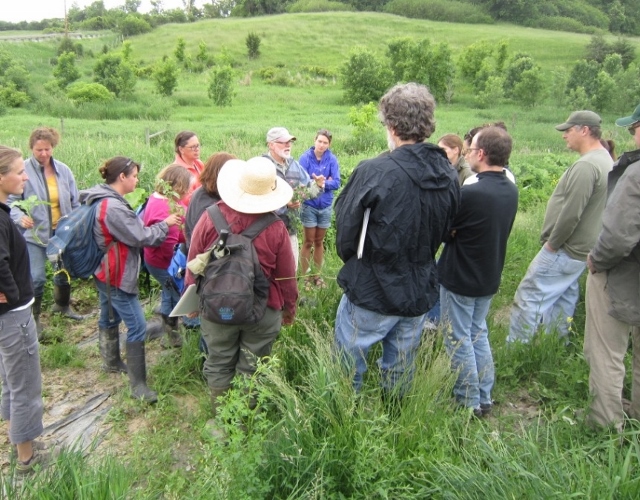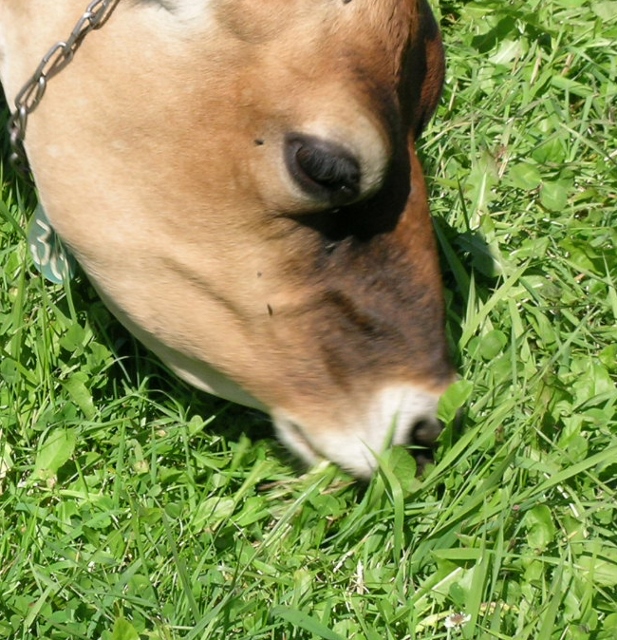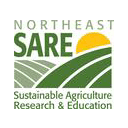New England Forage and Weed ID and Management Training Project






About the Project
Note: This project was completed in 2016. The valuable resources produced are now being hosted by the Northeast Pasture Consortium
 This
two-year professional development project, funded by Northeast SARE, is
designed to help agricultural service providers and personnel working
in Extension, USDA NRCS, State agricultural agencies, and
non-government organizations
throughout New England better identify forage/pasture plants
and forage weeds and study pasture and haycrop management strategies to
optimize forage production and quality on livestock farms.
This
two-year professional development project, funded by Northeast SARE, is
designed to help agricultural service providers and personnel working
in Extension, USDA NRCS, State agricultural agencies, and
non-government organizations
throughout New England better identify forage/pasture plants
and forage weeds and study pasture and haycrop management strategies to
optimize forage production and quality on livestock farms.
Trainings will be conducted through in-person sessions (which will
include classroom and in-field components) and webinars (delivered live
but also archived as online resources). Participants will be expected
to conduct a self-study of assigned forage and/or weed species and
develop management “help” factsheets; these will be compiled into a
resource guide for use among trainees as well as farmers. Participants
will also be expected to conduct a farmer educational activity (e.g.,
workshop, field day, video, etc.).
Participant Benefits and Expectations
Benefits
As a participant of this project, you will receive the following benefits:
- 30 hours of training provided by forage and weed
specialists. All expenses (travel, lodging, meals, etc.) will be
covered by the grant.
- Forage and weed species ID materials.
- Access to soil and hay probes and other field tools.
- Professional continued education units (CEUs) like CCAs, PATs, etc. as requested.
- Network of trained colleagues throughout New England.
Expectations
- Full participation. Participants must be committed to
attending training sessions and following through with the development
and implementation of their farmer education programs.
- It is estimated that participant time
commitment for the training and self-study will take about 40 hours per
year. We expect that participants will participate in every training
offered (see year 1 calendar below).
- Each participant will
select both a weed and a forage species and develop a “help” or
factsheet that will outline the biology and management options relevant
to New England. The factsheets will be compiled and shared with fellow
participants in year 2.
- In the second year, participants
will be expected to develop a farmer educational program related to
weed and/or forage management for no fewer than 5 producers. We expect
that participants will document this programming, outlining successes
and difficulties in forage and weed management on these farms.
Resources and training will be provided to help facilitate this
process for both program devemopment and evalutaion.
Year 1 Training Calendar
- September 10-11, 2014: First In-Service Training, to be held in southeast NH (location to be announced)
- Webinar Series (offered each month from 1:00 to 2:00 pm ET)
- November 13, 2014
- December 11, 2014
- January 6, 2015
- February 3, 2015
- March 10, 2015
Year 2 Training Calendar
- In 2015, a second two day In-Service Training will be held in May or
June.
- At least three to four additional one-hour webinars will be provided.
- The dates for Year 2 trainings will be determined by the participants and
instructors in Year 1.
For More Information
The project is a collaboration between the University of Vermont
Extension and the University of Maine Cooperative Extension. The
project team includes:
- Sid Bosworth, Project Lead, University of Vermont
- Richard Brzozowski, University of Maine
- Rick Kersbergen, University of Maine
- Deb Heleba, University of Vermont
| Northeast
SARE is a regional program of the nationwide SARE which offers
competitive grants to projects that explore and address key issues
affecting the sustainability and future economic viability of
agriculture. The program is authorized under Subtitle B of Title XVI of
the Food, Agriculture, Conservation, and Trade Act of 1990. It's wider mission is to advance, to the whole of American
agriculture, innovations that improve profitability, stewardship, and
quality of life by investing in groundbreaking research and education. For more information go to, http://www.nesare.org/ |












 This
two-year professional development project, funded by Northeast SARE, is
designed to help agricultural service providers and personnel working
in Extension, USDA NRCS, State agricultural agencies, and
non-government organizations
throughout New England better identify forage/pasture plants
and forage weeds and study pasture and haycrop management strategies to
optimize forage production and quality on livestock farms.
This
two-year professional development project, funded by Northeast SARE, is
designed to help agricultural service providers and personnel working
in Extension, USDA NRCS, State agricultural agencies, and
non-government organizations
throughout New England better identify forage/pasture plants
and forage weeds and study pasture and haycrop management strategies to
optimize forage production and quality on livestock farms.